Game theory reveals a chilling reason for denying climate change
Fixing the climate has a cost. So does failing to fix it. Both costs are huge, but if you believe that climate change is a real phenomenon, then the human and economic costs of inaction are staggering. What justifies failing to act? My analysis reveals that the explanation that many Republicans stand behind — that climate change is not real — may not be the full story, because it ignores the people who will profit from a warmer, more chaotic world.
In this analysis, I don’t take a position on the reality of climate change. These are facts: First, that 97% of climate scientists agree that human-generated climate change is real. Second, most Republicans, including 50 US Senators, do not agree. Donald Trump has said that global warming is a hoax and plans to pull out of the climate change agreements reached in Paris. The scientists and the Republicans are not going to convince each other, and I am not here to (fruitlessly) try to convince anybody.
Instead, I’d like to use game theory to look at what sort of economic reasoning the folks on each side have, to understand their positions. To do this, I have to estimate two things: the costs of different outcomes and the probabilities that different people place on those outcomes.
The potential outcomes of climate change
Broadly, there are three potential states that the world may be in with respect to global warming and climate change:
- Global warming is not real.
- Global warming is real, but it is too late to stop it.
- Global warming is real and it can be stopped.
Based on the public statements of candidates and politicians, here’s how they appear to assess the probability of these outcomes. (Don’t get too hung up on the actual numbers here — they key is that they are at opposite ends of the spectrum.)
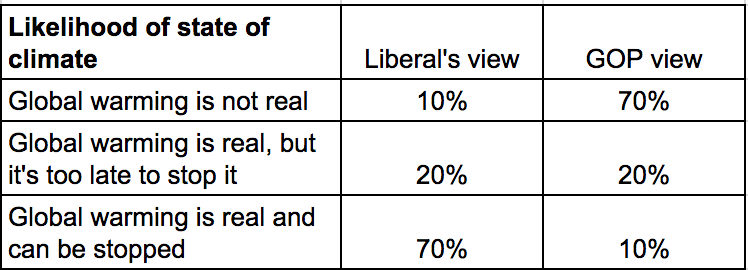
The economic value of climate outcomes
To assess the outcomes, I look at the world economic situation in the next the next 30 years. I created an (admittedly imprecise) scale that reflects potential futures, from +100 (economic utopia, widespread growth) to -100 (entrenched depression, start of a dark age). The current state on this scale is about +50.

Now we need to assess the outcomes that various actions would generate.
For example, if global warming is not real and we do nothing, we end up pretty-much where we are now (outcome = +50).
On the other hand, if do nothing and global warming is real, then the resulting displacement — flooding of major parts of the world, droughts, disruptions to agriculture, and food shortages — would create enormous economic hardship. War over resources is likely (as happened when the US oil supply was threatened in the Gulf War).
Intervening to stop climate change has a cost, too. Preventing or slowing greenhouse emissions would disrupt major parts of the economy, including transportation, power generation, and agriculture (because, no joke, cow farts are a major source of greenhouse gases). I estimate that these actions would reduce our economic state from +50 to +30 on my scale, and to +20 in the case that global warming is real and fixable (because then we’ll be suffering from both the economic pinch of slowing emissions and some of the effects of global warming.) If it’s too late to fix, we end up with the worst of both worlds, having spent our resources in a futile attempt to prevent global warming. This table sums up the value of the various outcomes (and again, this analysis is not too sensitive to small changes in these values)
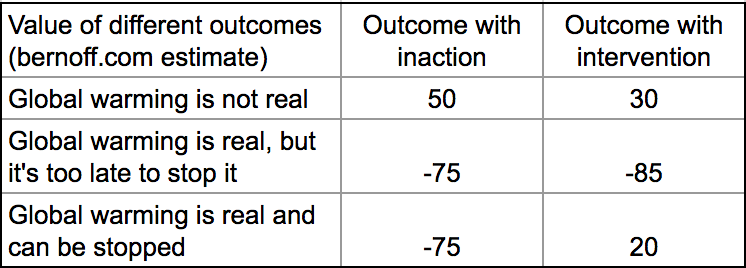
Analyzing the climate change decision
Using the liberal and GOP probabilities, now, we can understand how the different sides view the economics of the decision to act, or not to act, to slow global warming. In this analysis I calculate a weighted average of the outcomes based on the probabilities — the expected value of intervening to fix the climate, or of failing to act.
- The liberal’s view reflects “We have to do something, even though it is costly.” In the liberal’s view, the expected value of inaction is a disastrous -63. The expected value of intervening is 0 — a recession, which reflects both the chances of an expensive fix for the problem and the chance it may be too late to fix it.
- The GOP’s view reflects “We must not spend on an unlikely event.” In the GOP view, the expected value of inaction is +13, weak economic growth — which reflects a low probability of disaster mixed with a high probability of status quo. But the expected value of intervening is +6 — barely above recession, reflecting the huge costs of intervention. Neither is great, but it’s still better to do nothing.
Here are the expected values in table form:

So far, this just ratifies our intuition about the different positions. But the value of this game theoretic analysis is that it shows at what probability the GOP might change their views. If we hold the probability of “Global warming is real but it is too late to fix” at 20%, but look at different estimates of the value of global warming being real and stoppable, we get the following chart, where the blue represents the expected value of inaction, and the red, the expected value of intervention.
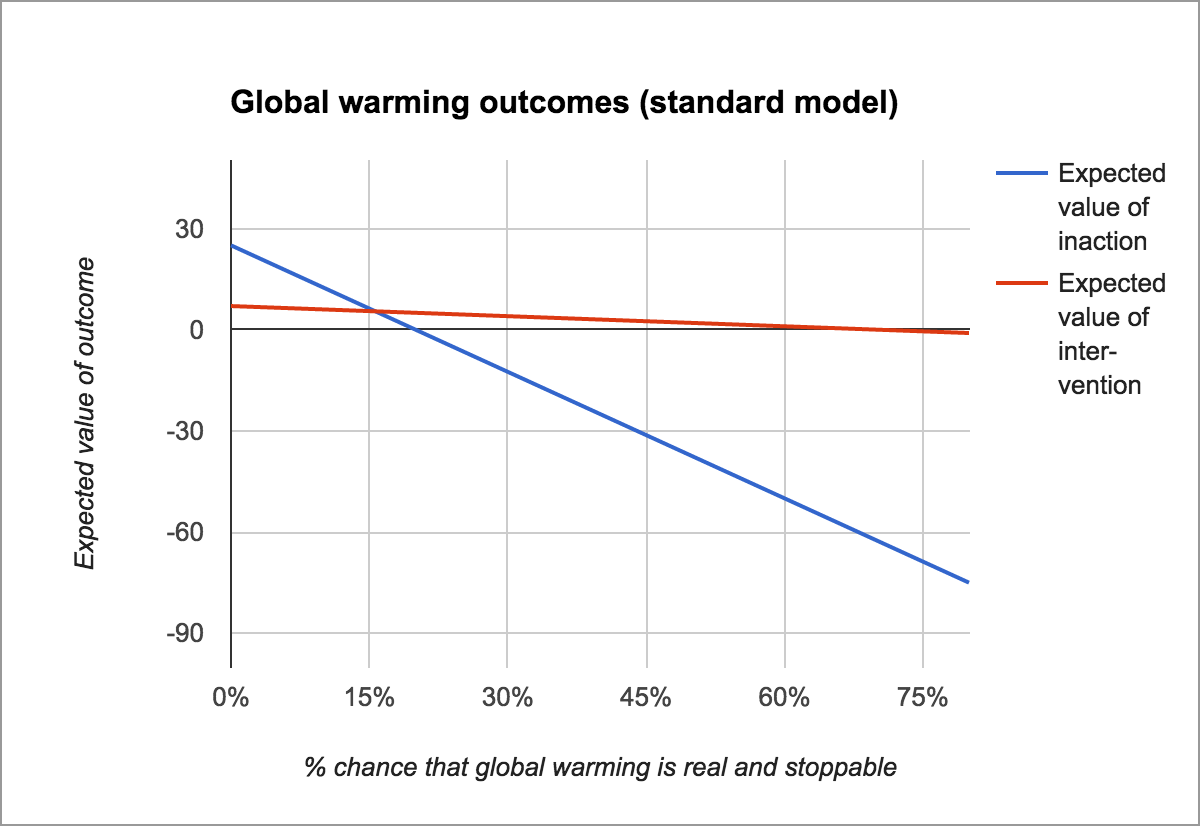
In this chart, the GOP’s view is at the left side, and the liberal’s view at the right side. Interestingly, the crossover point is at about 16%. So if you believe the chance of stoppable global warming is greater than 16%, you should favor intervention. (Of course, this varies based on my estimates of the economic value of the various outcomes, but regardless of how you score them, the crossover point lands somewhere between 10% and 30%.) In other words, you have to believe that stoppable global warming is very unlikely to prefer inaction.
If this explanation seems insufficient, I have another hypothesis, which I call the cynic’s view.
Why rich cynics actually prefer global warming
Imagine for a moment that you are in the top 1% of Americans by wealth, which means you are worth at least $8 million. For the purposes of this analysis, I am also going to posit that you selfishly care only about yourself, your family, and other rich people. Let’s call someone in this position a “cynic.”
The cynic may actually prefer a world in which global warming is real.
True, the world will have entered a global worldwide depression. But in a depression, people with resources can defend themselves. They can move to places that are safe and not too warm. They can afford food when it is expensive. They can benefit from the continued high demand for commodities like oil. For a rich cynic, the value of a world of global warming is actually higher than the world they live in now.
The rich cynic might assign values to the outcomes very differently, putting a world with global warming at a +75 instead of a -75. And the cynic does not want to spend money regulating emissions, since this interferes with their free spending of their wealth. The cynic’s outcome matrix now looks like this:
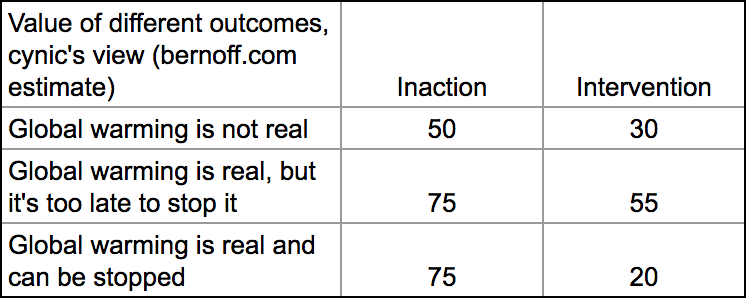
Now the cynic can admit that they believe the scientists, generating the following outcomes and expected values.
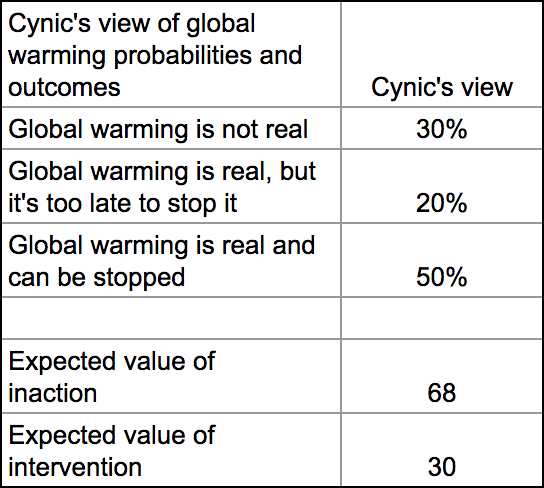
So even though the cynic believes in global warming, it’s way better to do nothing about it, since the cynic actually benefits in a post-global-warming world. And interestingly, the cynic’s view against intervention will remain the same regardless of the probability they assign to global warming, as you can see from the chart below. In fact, the more likely that there is global warming, the more the cynic wants us to do nothing to stop it.
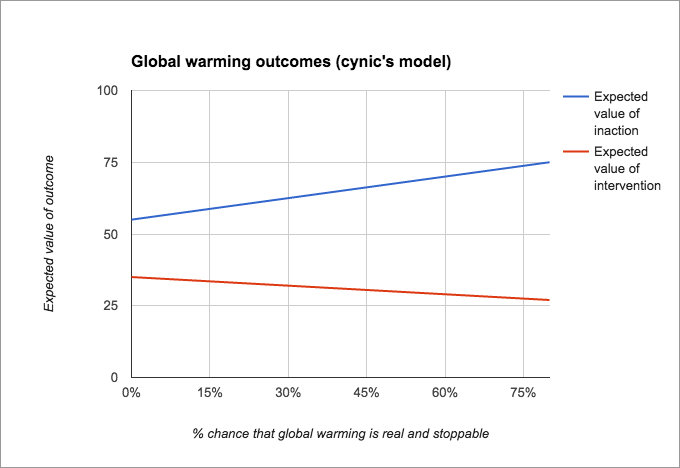
If you were a cynic like this, you would do everything possible to convince politicians that global warming was a hoax, even though you might believe it was true. In other words, you would lie about your opinions about climate change to bring about a warmer world in which you extended your power and wealth.
Some of the politicians who profess not to believe in climate change are sincere. Some believe that government should never intervene on a grand scale, and that the free market will solve any problems of this kind. And some are cynics who would welcome a world of climate change. It’s difficult to tell why people deny climate change, but the analysis certainly looks different once your realize that some people would actually welcome it.